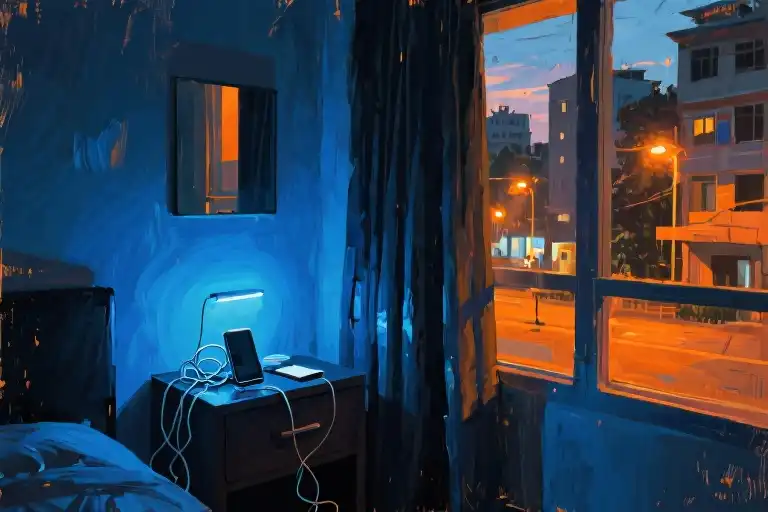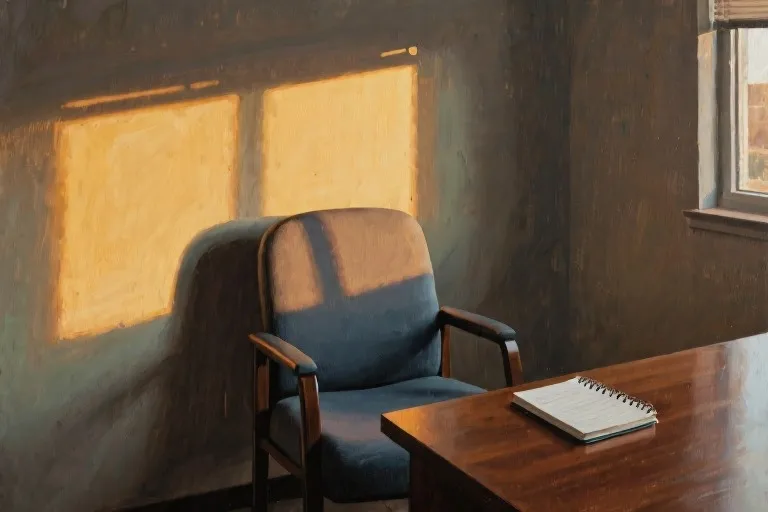The morning light barely made it through the blackout curtains, those thick fabric barriers I’d installed specifically to mute Jakarta’s relentless energy. Outside, the symphony of motorcycle engines and impatient car horns played on an endless loop—a soundtrack I’d learned to both resent and rely on, like the city’s heartbeat. Inside, the blue glow of a paused movie scene on my tablet illuminated a landscape of tangled charging cables and crumpled snack wrappers. My thumb hovered over the play button, but the characters’ frozen smiles suddenly felt alien, disconnected from the reality of my air-conditioned isolation.
This was day three of what I’d privately termed ‘The Great Jakarta Retreat.’ No brunch plans, no coworking space productivity, just the comforting womb of my 24-square-meter apartment where the only traffic jam occurred when too many browser tabs competed for attention. The digital clock read 10:37AM, though time had dissolved into something abstract since I’d stopped setting alarms. On the nightstand, my phone buzzed with its fifth notification of the hour—another GrabFood promotion for nasi goreng I wouldn’t order, because even interacting with delivery riders felt like too much human contact today.
Pulling the blanket tighter around my shoulders, I registered the familiar paradox: the tropical heat pressing against my windows while my body shivered under artificial Arctic airflow. Somewhere beyond these walls, the city carried on with its manic dance—office workers elbowing onto TransJakarta buses, street vendors balancing towers of fried tofu, influencers staging café photoshoots. Meanwhile, my greatest accomplishment this morning involved successfully pairing Bluetooth earbuds to drown it all out with a carefully curated ‘Urban Isolation’ playlist.
A particularly aggressive motorbike backfire startled me into awareness of my own absurdity. Here I was, a grown adult playing digital hermit in one of Southeast Asia’s most dynamic cities, treating my living space like some kind of anti-social fallout shelter. The irony wasn’t lost on me—the same person who’d once screenshot apartment listings with ‘ROOFTOP POOL!!’ captions now recoiling from sunlight like a vampire. Jakarta’s famous energy, the very thing that drew thousands of dreamers like moths to flame, had somehow short-circuited my internal wiring until ‘going out’ required the emotional preparation of deep-sea diving.
My fingers absently traced the outline of my phone case, that sleek rectangle containing all possible human connection yet somehow amplifying the loneliness. The lock screen displayed a backlog of messages—mostly group chats where my responses grew increasingly sparse, punctuated by apologetic stickers. One notification in particular kept drawing my eye like a bruise you can’t stop pressing: a two-day-old text bubble containing words that had haunted me through three work meetings and now this self-imposed exile. Words that somehow saw through my carefully constructed ‘Doing Great!’ façade to the exhausted reality beneath.
Outside, another motorcycle gang roared past, their engines screaming the universal language of urban impatience. I reached for the curtains out of instinct, then stopped myself. Maybe today’s small victory wouldn’t be total isolation, but letting in one thin sliver of Jakarta sunlight—just enough to illuminate the dust particles dancing in the air, those tiny witnesses to my strange urban hibernation.
The Hermit Protocol
The digital clock blinked 9:47 AM when I first noticed my thumb moving on autopilot – up, down, up, down – scrolling through a feed that somehow never ended. Three separate times my finger hovered over the same bubble tea promo ad, the cheerful “50% OFF!” banner clashing violently with the gray light seeping through my blackout curtains. Each time, something about the smiling model holding the drink made me exit the app entirely. Jakarta’s morning symphony of motorbike engines and construction drills played faintly through the walls, a reminder of why I’d chosen this self-imposed quarantine in the first place.
By 2 PM, I’d migrated to my laptop, watching the third romantic comedy of the day with one hand permanently on the right arrow key. The male lead’s confession scene (“You complete me”) became comically distorted as I fast-forwarded through it, his voice chipmunking into unintelligibility while an actual street vendor outside yelled “Bakso! Bakso panas!” at perfect comedic intervals. My half-eaten bowl of instant noodles sat congealing on the nightstand, its curling steam mirroring the heat waves rising from Jakarta’s pavement six floors below.
As dusk painted my walls orange, I plugged in my earphones and tapped my “Melancholia” playlist. The opening synth chords of Running Up That Hill pulsed through me, and suddenly I wasn’t lying diagonally across a sweat-dampened sheet anymore. In the music video playing behind my eyelids, I was sprinting through monsoon rains in slow motion, neon shop signs blurring into streaks of color as the bass dropped. For 4 minutes and 58 seconds, urban loneliness dissolved into something cinematic – until the song ended and I opened my eyes to see my tiny studio apartment exactly as I’d left it: charging cables snaking across the floor, a tower of empty snack bags by the bed, and the persistent glow of my phone screen showing 17 unread messages I couldn’t bring myself to answer.
This was urban escapism at its most basic – not some Instagram-worthy digital detox, just the quiet desperation of a twenty-something letting Jakarta’s gravity pin them to the mattress. The city kept moving outside my window (taxis honking, Grab drivers weaving through traffic, office workers marching toward late dinners), while I perfected the art of standing still through sheer inertia. My only accomplishment? Learning how thoroughly one person can disappear while physically remaining in a metropolis of 10 million.
Somewhere between my fourth YouTube rabbit hole and the moment my phone battery dropped to 7%, a terrifying thought occurred: What if this wasn’t just a lazy Sunday? What if hermit mode had become my default setting? The city’s energy drain wasn’t just metaphorical – I could actually feel it in my bones, like someone had replaced my marrow with lead weights. Every Uber ride through choked arteries of traffic, every elevator small talk session with neighbors who’d never know my name, every time I paid half my salary for a shoebox that never quite felt like home… they all added up to this: Me, voluntarily marooned in a sea of pillows, mistaking social media scrolling for swimming toward shore.
A Text That Broke the Bubble
The vibration startled me—three short bursts against the wooden nightstand. My phone screen lit up with a notification I’d been avoiding for two days: “I pretty concerned with your mental health.” The grammar mistake in his message made it feel more raw, more human. Like he’d typed it in a hurry, fingers stumbling over the keyboard with genuine worry.
I remember how different things were three months ago at the airport. That same friend had waved a How I Met Your Mother DVD case like a victory flag, grinning as he declared: “You’re about to become the real-life Ted Mosby!” Back then, Jakarta still shimmered with possibility—skyline dreams and spontaneous brunches, just like in the sitcom. We’d both laughed at the comparison, picturing my future self narrating romantic misadventures from some artsy downtown bar.
Now the phone’s glow highlighted half-eaten takeout containers on my bed. The contrast between his two messages—the excited prophecy and this abrupt intervention—hung in the air thicker than Jakarta’s humidity. Why this sudden shift? Had my Instagram stories of rooftop sunsets failed to mask the exhaustion in my eyes during last week’s video call? Or maybe he’d noticed how my replies had dwindled from paragraphs to single emojis over the months.
Urban loneliness has a way of leaking through digital cracks. We curate our social media to show the vibrant Ted Mosby urban life, but the unposted moments—the silent dinners for one, the Netflix autoplay countdowns—tell the real story. My friend’s text forced me to confront the gap between those two narratives.
As traffic horns blared outside (Jakarta’s never-ending soundtrack), I traced my thumb over the cracked screen protector. That little message had done what three months of mental health in big cities articles never could—it made me wonder if my hermit mode was less about avoiding traffic and more about avoiding myself.
The phone dimmed again, but the question remained bright as a convenience store neon sign: When did embracing the Ted Mosby within me turn into just trying to survive another day in this city draining my soul?
Jakarta vs. the Battery Inside Me
My phone battery percentage has become the most accurate metaphor for my life in Jakarta. Three full charges per day – once during the morning commute while watching TikTok through blurry taxi windows, again at lunch while pretending to read work emails, and a final desperate top-up before bed as I doomscroll through apartment listings I can’t afford. Meanwhile, my family group chat shows 17 unread messages spanning three weeks.
There’s a cruel symmetry in how my 2.5 million IDR studio apartment matches exactly what my former university counselor charges per session back in Bandung. I know this because I googled it last Tuesday at 3 AM, sandwiched between searching “signs of burnout” and “how to make instant noodles more nutritious.” The algorithm now serves me ads for meditation apps and coworking spaces in equal measure.
Jakarta operates on a different kind of arithmetic. Every Grab ride subtracts not just from my wallet but from some invisible emotional bank account. The 47 minutes spent crawling from Kuningan to Kemang yesterday cost me:
- 18% phone battery
- 3 near-death experiences with motorbikes
- Enough cortisol to power a small village
- 1 cancelled dinner plan with the friend who sent that text
My portable charger has become a life support device, its LED lights pulsing like some kind of dystopian heartbeat monitor. When the green light fades to red, I experience a panic that no amount of deep breathing exercises from wellness influencers can soothe. What if my maps app dies during monsoon rain? What if I miss a work email? What if – and this terrifies me most – I’m left alone with my thoughts during rush hour traffic?
Yet the real energy drain isn’t the tangible stuff. It’s the mental calculus of:
- Smiling through Zoom calls when my fan breaks during a blackout
- Calculating if I can afford both laundry service and therapy this month
- Pretending I’m “living the dream” for friends who still ask when I’ll visit Bali
The cruel joke? My actual job as a content strategist involves creating posts about “work-life balance” and “digital wellness.” My drafts folder contains three unfinished articles about urban loneliness that I’m too exhausted to complete. My phone’s screen time report mocks me with its cheerful infographics – 6 hours daily average, mostly split between productivity apps and staring blankly at transit maps.
Sometimes I conduct macabre little experiments. If I let my battery dip below 10%, which will give out first – my phone or my will to keep up appearances? Last Thursday, both died simultaneously during a team meeting. The silence that followed was almost peaceful.
What nobody prepared me for was how cities weaponize routine. The same Grab driver who remembers my coffee order also witnesses my slow unraveling – the way my hands shake less on Mondays (rested) and more on Fridays (depleted). The warung owner near my office has started adding extra vegetables to my nasi goreng without being asked. These small kindnesses feel like jumper cables to a soul running on empty.
My friend’s text lingers like an uncharged notification. Maybe he noticed what I’ve been ignoring: that surviving Jakarta requires more than just keeping your devices powered. That no amount of portable chargers can replenish whatever’s been slipping away since I got here. Especially with the absence…
The Unanswered Text
My thumb hovers over the glowing screen, casting a faint blue shadow across the crumpled sheets. The reply box blinks expectantly – a tiny vertical line pulsing like a heartbeat. Outside, another motorcycle gang roars past my apartment, their engines screaming through Jakarta’s humid night. The notification still reads “Delivered” from two days ago.
I press Mark as read instead.
Darkness reclaims the room as the screen goes black. Only the charging LED remains – a single red eye in the void. Through half-closed blinds, streetlights paint stripes across my wall, each one interrupted by passing cars. The AC unit coughs out its last cool breath before the midnight power saving mode kicks in.
Somewhere beyond these walls, my friend is probably sleeping. His “I’m pretty concerned about your mental health” now buried under group chats and meme forwards. The irony tastes like yesterday’s instant noodles – that the most human connection I’ve had all week came through a text that I’m too drained to answer.
Jakarta’s nocturnal soundtrack plays on:
- The thunk of garbage trucks behind the 24-hour convenience store
- A distant karaoke bar murdering Ed Sheeran
- My refrigerator humming the chorus
I count the traffic light changes across the street. Green (17 seconds). Yellow (3). Red (42). The timing feels personal. My phone lights up again – just a low battery warning this time. The 13% charge feels symbolic.
Maybe tomorrow I’ll reply. Maybe I’ll describe how urban loneliness isn’t about being alone, but about being surrounded by millions of lives that never intersect. Or how digital detox sounds great until your only comfort is pretending Spotify playlists are conversations.
For now, I watch the red LED blink slower…slower… matching my eyelids. The last conscious thought before sleep: that absence isn’t empty space – it’s the shape of whatever should be there.





